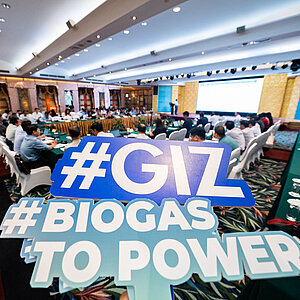Rice as New Green Energy in Viet Nam

Viet Nam has great potential to generate biomass energy from rice husks – a byproduct of rice processing.
As one of the world’s top rice-producing countries, Viet Nam has great potential to generate biomass energy from rice husks – a byproduct of rice processing that otherwise often goes to waste – but this opportunity needs to be tapped. The nation could exploit 9 million tons of rice husks for power, according to analysis in GIZ’s guidelines for biomass energy development published in 2021.
“Rice is the New Green Initiative”
To promote the sustainable use of rice husks as an energy resource, GIZ signed an agreement with Sanofi Viet Nam in September 2021 to advise on the Rice is the New Green (RING) initiative for conversion of industrial boilers to run on biomass at the multinational healthcare company’s local factories, thus reducing climate impacts and air pollution.
As part of the International Climate Initiative, GIZ’s Climate Protection through Sustainable Bioenergy Markets in Viet Nam (BEM) project will help Sanofi successfully convert existing diesel-fueled boilers to rice husk-fired technology. The IKI project will evaluate the RING Project’s technical and economic feasibility, including the project’s potential scale and costs, energy cost savings, potential, productive use of the rice husk combustion byproduct (such as bio-silica), and sustainable business models promoting a rice husk circular economy in Viet Nam.
Reduction of 2.300 tons of CO2 per year expected
The RING project is expected to reduce 2.300 tons of CO2 per year, reduce the cost of industrial steam by 40% and demonstrate feasibility to replace diesel fuel with 100% rice husk biomass energy in production processes, with the goal of further engaging private sector stakeholders in the sustainable development of the country’s economy, society, and environment.
The link has been copied to the clipboard
Contact
IKI Office
Zukunft – Umwelt – Gesellschaft (ZUG) gGmbH
Stresemannstraße 69-71
10963 Berlin





